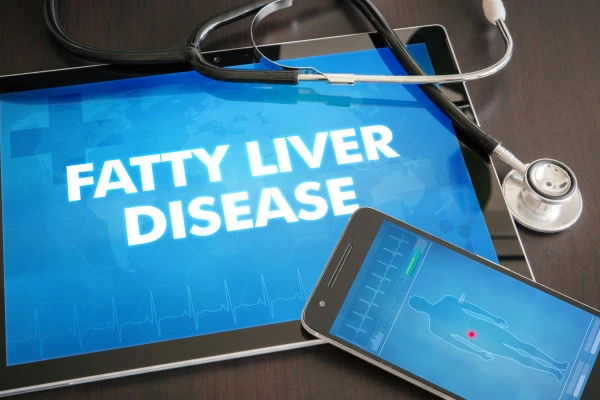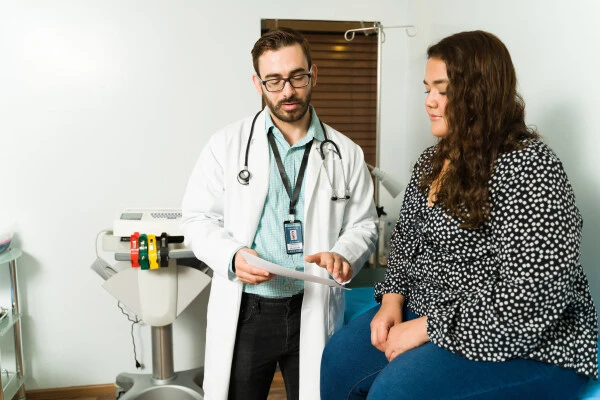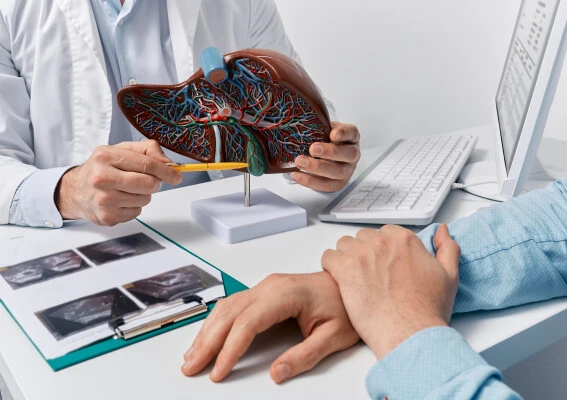 New Hope for People with Advanced Fatty Liver Disease
New Hope for People with Advanced Fatty Liver Disease
Exciting research suggests that a new approach could help even those with severe liver disease.
Nearly 40% of American adults are estimated to have fatty liver disease, a condition that can lead to serious complications—including liver failure and death. It often remains undiagnosed until it advances to cirrhosis, resulting in permanent liver scarring.
Until recently, doctors could only recommend diet and lifestyle changes or manage related conditions like diabetes and high cholesterol. However, these efforts often weren’t enough to stop the disease from progressing. Now, a groundbreaking study suggests that weight-loss surgery could significantly reduce the risk of severe liver complications—even for some patients with cirrhosis.
New Research Brings Encouraging Results

A study in Nature Medicine looked at patients with obesity and liver damage caused by a severe form of fatty liver disease called metabolic dysfunction-associated steatohepatitis (MASH). Since obesity is a key risk factor for MASH, researchers aimed to determine whether weight-loss surgery could enhance the health of these patients.
The findings were striking:
- Patients who had bariatric surgery were 72% less likely to develop serious liver-related complications (such as liver cancer) compared to those who didn’t have surgery.
- After 15 years, only 21% of surgery patients had a major liver complication, compared to 46% of those who did not have surgery.
Can Cirrhosis Be Reversed?
 MASH begins with fat buildup in the liver, which can lead to inflammation and scarring (fibrosis). Research has already shown that significant weight loss can reverse fibrosis and improve long-term liver health. However, there was little data on whether patients with cirrhosis—considered the most advanced stage of liver disease—could still benefit.
MASH begins with fat buildup in the liver, which can lead to inflammation and scarring (fibrosis). Research has already shown that significant weight loss can reverse fibrosis and improve long-term liver health. However, there was little data on whether patients with cirrhosis—considered the most advanced stage of liver disease—could still benefit.
“Most people assume that cirrhosis is a death sentence,” said Dr. Rotonya Carr, head of gastroenterology at the University of Washington. “But emerging data suggests otherwise.”
This new study, conducted by researchers at the Cleveland Clinic, analyzed 168 adults with obesity and cirrhosis caused by MASH. These patients had compensated cirrhosis, meaning they hadn’t yet developed life-threatening complications.
Weight-loss surgery led to significantly better outcomes, reducing the risk of complications like:
- Fluid buildup in the abdomen
- Brain fog and confusion caused by liver-related toxins
- Bleeding in the esophagus
- Liver cancer
Dr. Ali Aminian, the study’s lead author and director of the Cleveland Clinic’s Bariatric and Metabolic Institute, emphasized that long-term, sustained weight loss can dramatically alter the course of MASH—even in some of the sickest patients.
Are There Risks?
Patients with cirrhosis face increased surgical risks, but experts have noted positive safety outcomes in recent studies. Dr. Vandana Khungar, a liver transplant specialist at Yale University, pointed out that surgery can be a viable option when performed at a center experienced in treating cirrhosis patients. She highlighted the need to consider individual risks and ensure access to appropriate care when making treatment decisions.
What About Weight-Loss Medications?
 While bariatric surgery shows promise, some experts are hopeful that new weight-loss medications could have similar benefits. Recent trials of drugs like semaglutide (Ozempic, Wegovy) have shown that they can significantly reduce MASH-related liver inflammation:
While bariatric surgery shows promise, some experts are hopeful that new weight-loss medications could have similar benefits. Recent trials of drugs like semaglutide (Ozempic, Wegovy) have shown that they can significantly reduce MASH-related liver inflammation:
- In a Phase 3 study, 63% of patients taking semaglutide saw their MASH completely resolved, compared to only 34% of those on a placebo.
- Many patients also saw liver fibrosis improve by at least one stage.
So far, no studies have tested whether weight-loss medications can reverse Stage 4 fibrosis (cirrhosis). However, researchers are optimistic that better treatments—including both surgery and medication—could be on the horizon.
A Brighter Future  for Liver Disease Patients
for Liver Disease Patients
For decades, treatment options for fatty liver disease and cirrhosis were extremely limited. But thanks to new research on bariatric surgery and weight-loss medications, patients now have renewed hope. While more studies are needed, these findings mark a major step toward potentially reversing liver disease—even in its later stages.


